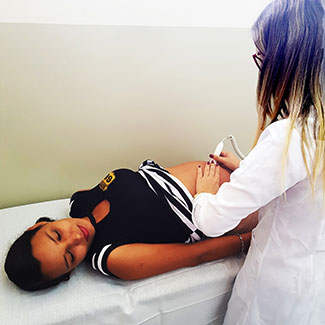Teen pregnancy can impact health for a lifetime
March / April 2018 | Volume 17, Number 2

Courtesy of Dr. Catherine Pirkle
An expectant teenage mother is examined in Brazil as part of a
Fogarty-supported study led by Dr. Catherine Pirkle of the
University of Hawaii, Manoa.
By Karin Zeitvogel
Adolescent girls - some as young as 10 - routinely give birth at the West African hospitals where Dr. Catherine Pirkle did doctoral research. "This clearly has long-term implications for their health - if they survive," Pirkle said. "Pregnancy and childbirth complications are the leading cause of death among 15- to 19-year-old girls globally, and women who give birth as adolescents seem to have particularly adverse health outcomes as they get older."
A study of postmenopausal women from several countries found those who gave birth as adolescents had a higher long-term risk for cardiovascular disease than childless women or those who gave birth as adults. Armed with a
Fogarty noncommunicable disease (NCD) grant for exploratory research, Pirkle set out to try to explain the relationship between teen birth and cardiovascular disease later in life.
"It could be that exposing biologically immature organs to a high dose of estrogen can induce subtle changes to glucose metabolism, which might impact metabolic syndrome or diabetes," she said. "Or it could be that the social consequences of adolescent childbearing are more pertinent: adolescent mothers drop out of school, have fewer economic opportunities and more stresses in life. Being a teenaged mother, especially without adequate support, does not appear to be good for your health."
Now an assistant professor at the University of Hawaii at Manoa, Pirkle has teamed up with researchers in northeastern Brazil, led by Dr. Saionara Camara, to follow a pilot cohort of adolescent and adult women who are pregnant for the first time, from the start of pregnancy to six weeks postpartum. As part of the project, trainees are being given instruction on research practices, offered courses on epidemiological best practices, and provided specialized training in ethical research conduct when working with pregnant and adolescent women.
Building on the capacity developed with Fogarty support, Pirkle said she is planning a longitudinal cohort study to lay the foundation for a more comprehensive investigation of ties between adolescent childbirth and poor health in later years.
More Information
To view Adobe PDF files,
download current, free accessible plug-ins from Adobe's website.